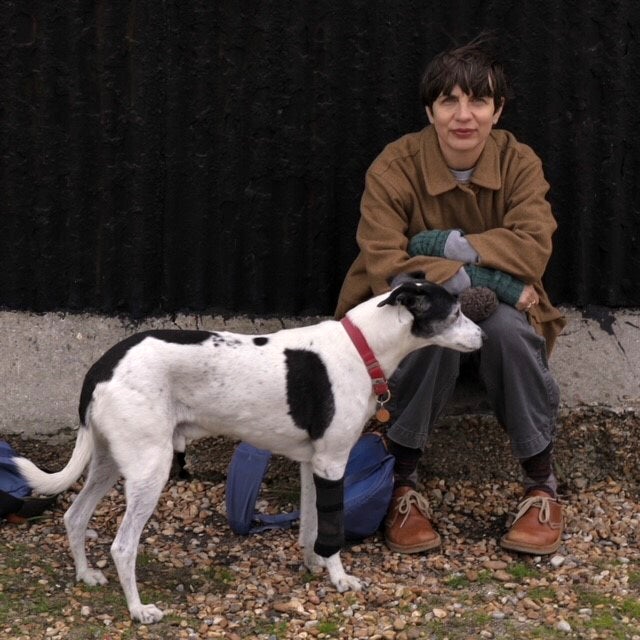‘I had a lot of trauma in my system’: Kate Hardie, the actor turned novelist writing her own trigger warnings
Kate Hardie’s ‘This Is Where We Live’ may be the most gripping account of motherhood since Rachel Cusk’s ‘A Life’s Work’. She talks to Nick Duerden about ‘unforgivable’ characters, giving up acting, and why her father Bill Oddie hasn’t read her book


At the beginning of Kate Hardie’s debut novel, This Is Where We Live, there is a disclaimer. “In this book,” it reads, “there is talk of self-harm and harm to others. Unsafe parenting and scared children. Suicide, transphobia, misgendering, birth trauma and postnatal depression. Broken families and absent fathers.”
This isn’t the work of a sensitivity reader, but rather the author’s own initiative. “I’m not a massive fan of sensitivity readers,” Hardie tells me one July morning, Zooming from her home in North London. “And so this is just me giving trigger warnings, and being aware that we need to respect one another’s lived experiences.”
It takes merely a few pages of reading to confirm that the book’s warning is entirely warranted. This Is Where We Live tells the story of a single mother, with a teenage child, who “wakes to blood in her mouth and flesh under her fingernails”. She struggles to ascertain what in life is real and what is not, and spends much of her daily existence feeling either great fear or, its counterpart, rage. Occasionally, she is moved to bite chunks out of her arm and spit the entrails down the toilet bowl. A sample sentence: “There’s raw ripped flesh between my teeth, torn skin and drying blood.” Another: “The smashing, the ripping, the tearing and the screaming. No remembering of love, no deep breathing, no gratitude lists or happy-baby yoga pose, just the rushing in of something too full, too furious.”
This is no mere domestic horror, whose chief intent is to shock and appal all the way to its ITV1 screen adaptation. Rather, it’s an entirely disquieting account of how the day-to-day fact of being a parent and existing within the world can sometimes unravel an already fragile grip on one’s mental health.
“I’ve always been obsessed with unlovable and unforgivable characters,” says Hardie, who is 55 and lives with her second husband, “I suppose because, in the past, I myself have felt unforgivable.”
Hardie, once an actor, says this with an admirable bluntness; a candour that feels unactorly, given those in the profession can sometimes hide behind a carefully constructed façade. But then that’s entirely the point here: Hardie hides behind nothing any more. When I ask if she really has felt “unforgivable”, she nods almost eagerly, no breaking of eye contact. “There’s been a lot of things in my family, and around it, that in a normative world would probably be talked about as unforgivable.”
Hardie’s father, the television comedian and birdwatcher Bill Oddie, has struggled for many years with his mental health, and has spoken in the past about bouts of severe depression for which he received treatment in a psychiatric hospital. Hardie herself, who was raised by her mother, Jean Hart, after her parents separated, has also had struggles with her mental health. At the end of her book, she writes a coda, almost in explanation of the text. “I have lived my own version of some of the experiences that I have fictionalised here. Personal experience was my reason to write, an attempt to voice those thoughts and feelings it is often not easy to give voice to.”

This Is Where We Live is perhaps the most gripping account of motherhood since Rachel Cusk’s A Life’s Work, and is likely to be similarly divisive. Of this, Hardie is acutely aware. “Mumsnet is one of the most intensely uncomfortable and nasty places to get involved with, so I won’t be looking there,” she says, “but one friend who went through a very difficult birth read it, and said that she both wanted to read it again every day, and also never again.” She beams. “I loved that so much, I wanted it as a quote on the cover!”
Hardie first started acting in the 1980s, at the age of 14. This was her attempt to escape a fairly fraught childhood. Her father had left home, and she struggled in the classroom. “I was dyslexic, though I wouldn’t receive that diagnosis until I was 38, and so at school I was in trouble a lot.”
She had early roles in Casualty and then in the films Mona Lisa and The Krays. The characters she played were often riven with psychological conflict and visible distress. She was a fine screen actor, but never much liked it. “I worked a lot with a director called Antonia Bird,” she says, “and she always told me that I was a writer, a director, not an actor. I sort of ignored her until my late thirties, when I’d finally had enough. That’s when I went back to school to do a writing degree. All the people I’ve most admired,” she adds, “have been writers: Alan Bleasdale, Carrie Fisher, Dennis Potter.”
A friend said that she both wanted to read [the book] again every day, and also never again
She did return to the screen intermittently, including playing a small role in the Robbie Coltrane drama National Treasure in 2016, but ultimately called time on her acting career shortly after. “The last job had me cast as a survivor of rape giving testimony in a historical rape trial. I just thought that if that’s the best they had to offer, then I’m off. I didn’t want to dye my hair, or do my teeth. I didn’t want to smooth my forehead.” She sighs. “Let me tell you, to be an older woman and to act is just a drudge.”
She believes she was drawn to acting in the first place because she had plenty to exorcise. “I had a lot of trauma in my system, and I suppose I was good at showing that on screen. I liked the idea of communicating things, but writing always felt like a much better fit.”
She loved studying film, and her tutors believed she’d make her first feature within a year. But 15 years later, she’s still trying. “The film business is torturously slow. I’ve had a lot of scripts in development, but none have made the screen yet.”
And so she turned to fiction, and began to write her novel in 2020, shortly after the death of her mother, and just as the world was going into lockdown. “My mother was a very tough old working-class socialist; she knew her mind,” Hardie says. “And so when she got a dementia diagnosis, she immediately said, ‘Right, I’m out of here.’ We went to controversial old Switzerland with her [to end her life], and that was brutal, just brutal.”
Let me tell you, to be an older woman and to act is just a drudge
You might think that a period of mourning coupled with the existential crisis she felt during the pandemic was hardly the best mindset in which to enter into novel-writing, but Hardie is clearly her mother’s daughter: she’s “very tough”, too. Writing the book, she says, gave her focus. “It was difficult, of course, and I wrote it in chunks, but I found I really enjoyed it.”
The main hurdle an author faces when writing something this disturbing is the likely reaction of family, and getting onside. “I went to my child every step of the way – they are very literary, and that was very helpful,” she says. (Lyle, whom she had with celebrity photographer Rankin during their brief marriage in the 1990s, is 27 and works as a library assistant.) “And I also went to my ex-partner, and he read it, and we talked.”
And her father? She shakes her head. “I haven’t done so with my dad, no, because he’s not mentally in a very well state; I don’t think he’d have the capacity to take it on board. But his wife has read it. My family has been through a lot regarding mental health, and I think we all advocate talking about it in different ways. I like to think he’d get it.”
Her friends, meanwhile, have shown Hardie real and genuine compassion after reading the novel. But then this is hardly surprising; it’s that kind of book. When you’ve finished reading it, your thoughts immediately go out to her.
Hardie smiles. “Friends have been very supportive, and, yes, they do ask if I’m OK. I tell them I am. I’m in a very stable relationship now [her husband of 10 years works as a gaffer on film sets], I have a lot of therapy under my belt, and I know how to manage my health in a way that I simply didn’t when I was a young woman. I still struggle at times – poor mental health is not a thing we ever get to fully walk away from, is it? But that,” she says, “is a huge reason why I wrote the book. To talk about our mental health, and to explore it – fearlessly.”
‘This Is Where We Live’ by Kate Hardie is published by 4th Estate



Join our commenting forum
Join thought-provoking conversations, follow other Independent readers and see their replies
Comments